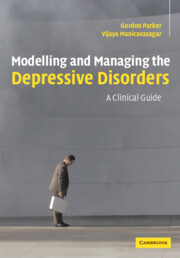Book contents
- Frontmatter
- Contents
- Acknowledgements
- Introduction
- Part I The current model for depressive disorders and its impact on clinical management
- Part II The diagnosis and management of melancholic and psychotic depression
- Part III An introduction to non-melancholic depression
- Part IV Modelling and managing the non-melancholic depressive disorders
- Appendix 1 The DMI-18 and the DMI-10
- Appendix 2 The CORE system of measuring psychomotor disturbance
- Appendix 3 The temperament and personality measure
- References
- Index
Introduction
Published online by Cambridge University Press: 17 August 2009
- Frontmatter
- Contents
- Acknowledgements
- Introduction
- Part I The current model for depressive disorders and its impact on clinical management
- Part II The diagnosis and management of melancholic and psychotic depression
- Part III An introduction to non-melancholic depression
- Part IV Modelling and managing the non-melancholic depressive disorders
- Appendix 1 The DMI-18 and the DMI-10
- Appendix 2 The CORE system of measuring psychomotor disturbance
- Appendix 3 The temperament and personality measure
- References
- Index
Summary
There are major problems in modelling the depressive disorders and in evaluating available treatments. In the last few decades, the Diagnostic and Statistical Manual of Mental Disorders (DSM) (American Psychiatric Association, 1994) model has dominated the classification of depression. It shares its largely dimensional model with the World Health Organisation's International Classification of Diseases (ICD-10) (World Health Organization, 1992) recent classificatory system. Thus, the current dominant model for conceptualising the depressive disorders is a dimensional or continuum view – with depression essentially seen as a single condition varying by severity.
We have long argued for a differing paradigm: one that allows (on the basis of specific clinical features) categorical status to certain expressions of depression such as melancholia and psychotic depression. However, once these more categorical conditions are excluded from the broad landscape of ‘depressive disorders’, there are difficulties in modelling the heterogeneous residue of non-melancholic conditions, as they are not categorical, vary in their status (as disorders, conditions, and stress responses) and are often multi-axial. For these, we favour a ‘spectrum’ model: viewing them as reflecting an interaction between salient life stresses and personality style.
In addition to challenging current diagnostic models we also challenge the ‘evidence base’ for evaluating antidepressant therapies. We question the reliability or ‘gold standard’ value offered by evidence-based approaches, at least as currently undertaken. We do not dispute the ideal – whereby judgements about the effectiveness of available antidepressant treatments benefit from randomised control trials (or RCTs) – when such data provide objective, impartial, systematic, and valid information.
- Type
- Chapter
- Information
- Modelling and Managing the Depressive DisordersA Clinical Guide, pp. ix - xiiPublisher: Cambridge University PressPrint publication year: 2005



